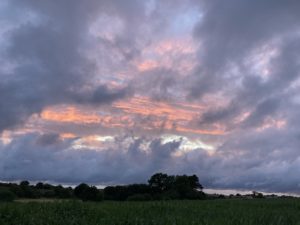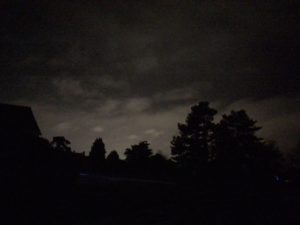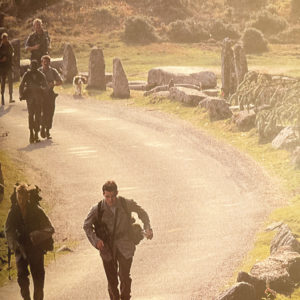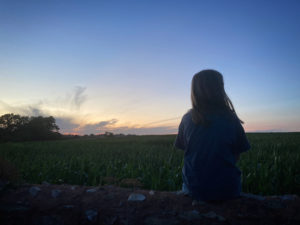As Old Crockern rises again on Dartmoor, Mark Hooper poses the question: are England’s Right of Way laws fit for purpose?

‘The old spirit was as grey as granite with deep set eyes as black and watery as peat pools and his hair was the green of lichen.’
You have probably heard about Old Crocken in recent weeks. The guardian spirit of Dartmoor, often depicted as a druidic figure with antlers or ram’s horns, riding a skeleton horse, is detailed in A Book of the West, an 1899 guide to the history and folklore of Devon and Cornwall by Sabine Baring-Gould (1834-1924). Baring-Gould was a Victorian priest, folk songwriter, author and antiquarian who lived near Okehampton on the northern edge of Dartmoor. He was also a pioneer in recording and conserving the many prehistoric sites and stone circles on the moors. He would no doubt have approved of the prominent role that Old Crockern played during the mass protests against the withdrawal of the right to wild camp on Dartmoor that took place in January. The ancient spirit cropped up in imagery, banners, outfits and even as a life-sized puppet as thousands marched towards the land owned by Alexander Darwall, the wealthy hedge fund manager and UKIP donor who is the perfect fall guy in this story.
Old Crockern, as Baring-Gould relates, proved the ruin of a wealthy landowner from Manchester who fenced off an area surrounding Crockern Tor for his own gain, announcing in a vision, ‘If he scratches my back, I’ll tear out his pocket.’
The affect on Darwall’s pocket is yet to be seen, but, as the writer George Monbiot eloquently put it while speaking to the organisation Right to Roam, ‘This symbolises everything that’s gone wrong in the countryside, where a tiny minority of very rich and extremely powerful people have grabbed all the rights and excluded the rest of us…I think this is a moment where things being to change, when the cycle start to turn, and we reclaim our rights.’
These rights have long been a grey area at best. A true ‘Freedom to Roam’ still exists in Scotland where, according to the Land Reform Act 2003, landowners are required to permit public access to most land for recreational purposes (including wild camping). The same cannot be said for England. The gov.uk website stipulates that ‘you can access some land [my emphasis] across England without having to use paths — this land is known as ‘open access land’…’Open access land includes areas that are privately owned as well as common land, and can be used ‘for walking, running, watching wildlife and climbing’. It cannot, however, be used for a variety of activities including driving a vehicle, horse-riding, cycling…and camping. What’s more, the 2000 Countryside & Rights of Way (CRoW) Act gives us this partial Right to Roam over a mere 8% of land in England.
Dartmoor has always been treated as an exception. Some 37% of the 950 square km of this National Park is designated as common land (or open access land), as defined in the Dartmoor Commons Act 1985, which, although it remains privately owned, has no restrictions on where walkers can roam. There has always been an understanding that this includes the right to wild camp — that is, to pitch your tent wherever you like, rather than to seek the permission of the landowner.

Night on the moors
This is where Mr Darwall comes in. Concerned that wild camping would disturb his pheasant shooting and deerstalking business, he appealed to the High Court for clarification of the law. In his ruling, Julian Faux, Chancellor of the High Court, stated that, ‘the 1985 Act does not confer on the public any right to pitch tents or otherwise make camp overnight on Dartmoor Commons. Any such camping requires the consent of the landowner’.
So there we have it. Now that a precedent has been set, the previous, fragile equilibrium (whereby a blind eye was turned towards wild camping) has been upset. Now other landowners will be able to challenge the gentleman’s agreement that has existed for centuries. A deal has already reportedly been struck allowing the right to camp to still exist on Dartmoor, but only if landowners are recompensed in some way. How this would work remains unclear — all that has been confirmed is that ‘a transfer of money’ will take place between the Dartmoor National Trust Authority and landowners. This could be a nominal fee of a pound, or much more — and could theoretically involve charging the public for the right to camp, and would only apply to certain portions of the moor.
The argument was that the right to wild camp never existed in law. This may be true. But it existed in collective memory, in a culture that stretches way back beyond statutes. This is important, because it speaks to a wider malaise affecting the country. A National Park you have to pay to use is like a National Health Service that charges you to be treated. This Tory mentality that the value of everything has to be weighed by its profitability is a very modern condition.
It shouldn’t divide across political lines, but it is political. It’s about power and its abuse: and of how the powerful deny common rights to the rest of us. This is a debate that is especially pertinent now, where the benefits of nature to our mental health have been proven. Surely a deeper engagement with the countryside is something that should be encouraged rather than criminalised?
The government and the rich landowners that prop them up would prefer it if we define this issue along typical, easily ridiculed lines: a ‘Crusties vs The Rule of Law’ dichotomy. But the truth is far more nuanced. Dartmoor is for everyone. It stands in many people’s eyes as a great leveller — a place where reputation and status stands for nothing: where Old Crockern will tear out your pocket if you don’t pay him your dues.
It’s probably time I declared my own oar in the game. Dartmoor has always been a big, brooding influence in my life — its dark, misty, mysterious secrets always there to be lost in and explored, from as early as I can remember. But that’s not to say it wasn’t a source of immense fun, too. Born in Totnes, less than 10 miles from the moors, I spent my pre-teen years living in various parts of Devon, mainly in and around Exeter (10 miles to the east of Dartmoor). I spent much of my childhood walking, camping and playing there with my family — jumping headfirst into gorse, bouncing on the springy peat, barely avoiding sinking into bogs, skipping across boulders on the Dart (there’s hardly a stream or a tributary my brother hasn’t managed to fall into there).

With my cousins on the Dart (seconds before my brother fell in)
But the moors weren’t just a source for recreation for our family. And here’s where it becomes nuanced. My dad was in the Marines, and his last job involved running their training programme in Devon, much of which is focused on Dartmoor, including the final test — a 30-mile ‘yomp’ across the moors (with the successful being presented their green berets in the field where the finish). Ramblers and military types are rarely cut from the same cloth, but — and I don’t think this is selective memory — my experience is that the two rub shoulders with a surprising degree of respect there. Despite certain areas being earmarked for military use, it’s not uncommon for overnight campers to wake up surrounded by cheerful marine recruits, or for ramblers to stumble into a practice ambush from soldiers hiding in the undergrowth.
Obviously, my personal experience of this was different to most. Sometimes, as a teenager, I’d take our dog, Hattie, for a walk on the moors with my Dad, giving those completing their 30-miler a bit of encouragement and much-needed distraction. Hattie became an unofficial pet to the exhausted recruits, who would throw her scraps of food from their ration packs, play with her as they took refueling breaks and shout encouragement to her as she joined them for legs of the course. My Dad would tell me it was good for their morale — some might be close to breaking point before Hattie appeared on the scene, her ears flapping as she bounded through the gorse, a welcome reminder that there was a real world beyond their bubble: a chance to laugh and smile and forget about their blisters for a few minutes.
Funnily enough, a few weeks ago, I was visiting my parents in Somerset and started flicking through a photographic book about the Royal Marines — one of the many my Dad has been gifted, usually because he provided a quote or gave the photographer permission to shoot behind closed doors. In a chapter about training was a spread showing marines crossing a bridge on Dartmoor. And there, unmistakably, was Hattie, 20 years since she died, her ears backlit in the sunshine while she kept pace with the stragglers.

Hattie running with marine recruits
Seeing her reminded me of other times I’d enjoyed on the moors. Even though we moved from Devon to Somerset in my teens, it was still the backdrop to many school experiences — from geography coursework to expeditions with the army cadets. But most of all (and most character forming), it was the landscape that hosted the Ten Tors — a health and safety nightmare, open to teenagers aged between 14-19, who are set loose across a course ranging between 35 and 55 miles (depending on age group) that has to be completed within 34 hours over a weekend in May. As such, you obviously need to be able to camp wherever you end up when (or preferably before) the sun sets. School kids are allowed to camp anywhere on the moor between 10pm on the Saturday evening and 6am Sunday morning.
There’s no doubt that the competition will continue, with benevolent landowners allowing access every year. But that’s not the point. Ten Tors instills a love of wild camping in the kids who enter. The beauty of sleeping under the stars is something that, for some of us, has impacted across a lifetime, not just one weekend in May.
It’s a privilege that should be available to all. And that means all. The abuse of power in the countryside isn’t just demarcated across class lines. Right of Way is a new programme of moving image works by the artists Ufuoma Essi, Dan Guthrie and Arjuna Neuman, commissioned with the Independent Cinema Office, addressing the question of access and inclusion in the UK countryside.
‘The new commissions interrupt and challenge the enduring perception of the rural idyll as an untouched and unchanging space where time stands still,’ the organisers explain. ‘What happens when Black, Asian and other ethnically diverse people enter these landscapes?’ By exploring how our natural spaces act as homes to protest, trespassing, activism and even raves, a different relationship with the landscape is presented.

Sunset with my daughter
As Right to Roam puts it: ‘The law of England should not be excluding us from nature, but encouraging us towards it. Lockdown demonstrated the vital importance of access to nature for everyone’s physical and mental health. With depression, anxiety, and obesity all on the rise, science is telling us that we need a deeper connection to nature.’
Dartmoor is a magic, unknowable place. For centuries people have traversed it. School children, soldiers, ramblers and holidaymakers have walked across it and camped whenever and wherever they have needed, without having to book in advance as if they are on some kind of glorified holiday camp. It belongs to all of us, and Old Crockern will tear the pockets of anyone who suggests otherwise.
*
‘Right of Way’ is showing at the BFI Southbank on 23 February and at LUX’s exhibition space until March.